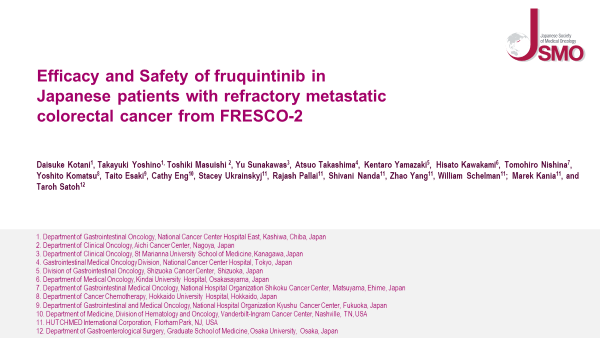JSMO2023: 呋喹替尼治疗日本难治性转移性结直肠癌患者
The outcome for patients in Japan from the FRESCO-2 multi-regional clinical trial of fruquintinib, an oral inhibitor of VEGFR-1, -2 and -3, are being presented at the 2023 Japanese Society of Medical Oncology Annual Meeting, taking place March 16-18 in Fukuoka, Japan.
| Title: | Efficacy and Safety of fruquintinib in Japanese patients with refractory metastatic colorectal cancer from FRESCO-2 |
| Presenter: | Daisuke Kotani, Department of Gastrointestinal Oncology, National Cancer Center Hospital East, Kashiwa, Chiba, Japan |
| Session: | Presidential Session of Gastrointestinal Cancer |
| Abstract No.: | PS4-5 |
| Date & Time: | Saturday, March 18, 2023, 11:15 am Japan Standard Time |
| Location: | Room 1 |

Background & Methods
FRESCO-2 is a global, Phase III, multi-regional, double-blind, placebo-controlled clinical trial (NCT04322539) conducted in the U.S., Europe, Japan and Australia that investigated fruquintinib plus best supportive care (“BSC”) vs placebo plus BSC in patients with refractory metastatic colorectal cancer (“CRC”), randomized 2:1. In total, 691 patients were enrolled in the study, of which 56 (8%) were from Japan.
In FRESCO-2, fruquintinib significantly improved the primary endpoint of overall survival (“OS”) (hazard ratio [“HR”] 0.66, 95% confidence interval [“CI”] 0.55-0.80; p<0.001) and secondary endpoints including progression free survival (“PFS”) (HR 0.32, 95% CI 0.27-0.39; p<0.001), disease control rate (“DCR”) and objective response rate (“ORR”), with a favorable toxicity profile. Fruquintinib or placebo was given 5 mg orally once a day on 3 weeks on, 1 week off, 28-day cycles. Key patient inclusion criteria included prior chemotherapy, prior anti-VEGF therapy, and if RAS wild type, prior anti-EGFR therapy; if BRAFV600E mutant or MSI-high, at least one prior targeted regimen; and prior exposure to trifluridine/tipiracil and/or regorafenib. These results were initially presented at the European Society for Medical Oncology Congress 2022 in September 2022.
Results
Among Japanese patients in the FRESCO-2 study, median OS was 6.9 months for the 40 patients treated with fruquintinib compared to 5.6 months for the 16 patients in the placebo group (HR 0.42; 95% CI 0.19–0.92; p=0.055). Median PFS was 3.6 months for patients treated with fruquintinib compared to 1.8 months for patients in the placebo group (HR 0.27; 95% CI 0.13–0.56; p=0.004). The DCR was 62.5% in the fruquintinib group compared to 25.0% for patients in the placebo group. The ORR was 2.5% in the fruquintinib group compared to 0% for patients in the placebo group. Median duration of follow-up was approximately 9 months for patients in both groups.
The incidence of treatment emergent adverse events for fruquintinib in Japanese patients from the FRESCO-2 study was higher compared to the entire study patient population. These events were typically managed with dose interruptions or reductions. Grade 3 or above adverse events occurred in 71.8% of patients who received fruquintinib, compared to 29.4% of patients who received placebo. Grade 3 or above adverse events that occurred in three or more patients (≥ 5%) who received fruquintinib were hypertension (nine [23.1%] vs none in the placebo group), hand-foot syndrome (seven [17.9%] vs none in the placebo group), and proteinuria (three [7.7%] vs. none in the placebo group).
Conclusion
In refractory metastatic CRC patients in Japan, fruquintinib demonstrated a clinically meaningful improvement in OS and PFS, and a safety profile that is consistent with FRESCO-2 results in the overall population. These results are expected to support fruquintinib as a potential new treatment option for Japanese patients with refractory metastatic CRC.
About CRC
CRC is a cancer that starts in either the colon or rectum. According to the International Agency for Research on Cancer, CRC is the third most prevalent cancer worldwide, associated with more than 935,000 deaths in 2020.[i] In the U.S., an estimated 153,000 patients were diagnosed with CRC and there were 53,000 deaths from the disease in 2023.[ii] In Europe, CRC was the second most common cancer in 2020, with approximately 520,000 new cases and 245,000 deaths. In Japan, CRC is the most common cancer, with an estimated 148,000 new cases and 60,000 deaths in 2020.1 Although early stage CRC can be surgically resected, metastatic CRC remains an area of high unmet need with poor outcomes and limited treatment options.
Reference:
[i] The Global Cancer Observatory. Accessed December 12, 2022.
[ii] Siegel RL, Wagle NS, Cercek A, et al. Colorectal cancer statistics, 2023 [published online ahead of print, 2023 Mar 1]. CA Cancer J Clin. 2023;10.3322/caac.21772. doi:10.3322/caac.21772